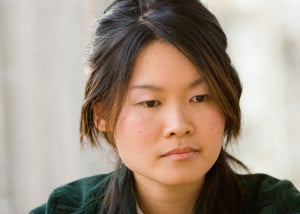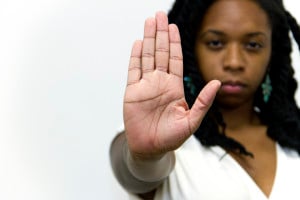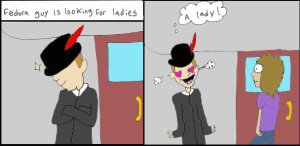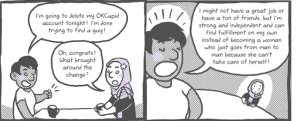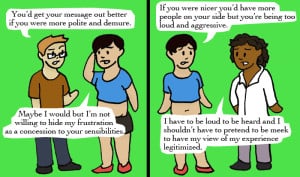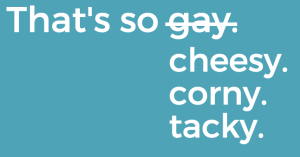
An elderly person struggles to learn to write.
Going to college was quite a shock for me.
I struggled to grapple with the change in how people socialized. I struggled with being sick all the time because I was exposed to so many new germs on a daily basis. I struggled with adapting to being among thousands of different strangers for most of my day.
But the most shocking thing of all was that, in my university space, there was a great deal of bigotry and oppression – which was not something expected.
I was the first person in my family to attend college, and I had a warped, romanticized idea of what academia was like. I assumed that nobody would hold oppressive views, partly because I thought all educated people were open-minded and progressive.
In hindsight, that seems like a really silly assumption to make.
But a part of the reason why I thought all educated people were open-minded is because I conflated bigotry with a lack of education.
In social justice circles, we often say that bigoted people are uneducated. We usually mean that they’re ignorant to social issues.
This may be true in a few cases, but calling oppressive people “uneducated” often leads to people believing that those with formal education are incapable of bigotry — which is counterproductive to fighting systemic oppression.
So I’m gonna need us – especially those of us in social justice activism – to rethink this.
Here’s why.
1. It Implies Educated People Can’t Be Bigoted
I’m saying this as someone who’s been involved in campus activism for a few years now: Some of the most bigoted people I’ve ever met are also the most educated people I’ve met.
On university campuses, I’ve met a lot of people who’ve also held that misguided, idealistic idea that educated people are more likely to be open-minded. This assumption makes it even harder when we realized how oppressive university spaces can be.
We only have to look at how some professors refuse to use trigger warnings to understand that educated people can be ableist. In my first year of university, a tutor of mine – one with a doctoral degree – said that people with mental illnesses who drop out are simply “not trying hard enough.”
I was shocked, because I assumed an educated person would know how misguided and dangerous this statement was.
The prevalence of rape culture on campus is yet another example of how educated people can uphold oppressive systems. Often, the policies, traditions, and language that uphold rape culture are used and perpetuated by highly educated academics.
When we imply that educated people can’t be bigoted, we erase the harm they do. It leads to educated people often thinking they’re above reproach.
This can be harmful on a larger scale, too. Consider how the eugenics movement was supported by well-respected, well-educated scientists, as well as scientific communities like the American Eugenics Society and the British Eugenics Society.
Most of us now associate eugenics with ableism and racism, and rightfully so – but at the time, the support of academics gave the movement weight and somewhat hid how horrific the practice was to the public.
Another example is conversion therapy, which is the practice of using therapy to “change” someone’s orientation or gender identity.
A few decades ago, the practice was fairly commonplace. Now, the practice is opposed by many health and counseling associations who believe it to be an inefficient, oppressive, and dangerous practice.
It’s still legal in many countries. Those who perform conversion therapy are usually psychologists, psychiatrists, counselors, and other educated individuals.
Educated people are more than capable of being bigoted.
This is partly because understanding academic concepts doesn’t always result in people understanding the urgency of social justice activism.
It’s also important to remember that some institutions don’t encourage thoughtful, critical thinking, and that the way the content is taught can uphold the status quo instead of criticizing it.
Even in science-based subjects like math, certain narratives can be prioritized above others, thus perpetuating oppression.
That said, even when academics do understand the importance of social justice issues, they might still not be progressive. This leads me to my next point…
2. It Implies Bigotry Isn’t a Choice
When I was younger and less socially conscious, I definitely held some really bigoted, oppressive views.
Educating myself about social justice issues – both through formal and informal education – helped me rethink my stance on many topics. I realized how wrong my views were, and I recognized that my privilege affected how I viewed social and political issues.
I’m not alone here. Many people hold bigoted thoughts until they learn otherwise. That’s literally why I write articles like this – because I sincerely believe people can learn and change for the better.
Transforming society starts with transforming ourselves. Learning is one way we can do that.
Ignorance often causes people to be bigoted.
At the same time, though, bigotry doesn’t always manifest due to a lack of knowledge. Sadly, bigotry is often a choice.
Of course, we’re taught bigotry. Oppression is the status quo, and we’re socialized to accept and uphold it.
We need access to information that allows us to criticize society before we can begin to unlearn our ingrained prejudices. Without access to this information, it can be really hard to emancipate yourself from that mentality.
At the same time, there are a few people who have access to this information and still choose to be bigoted.
I worry that indiscriminately calling all bigots “uneducated” implies that it’s never a choice.
I’ve met people who choose to be bigoted despite knowing better.
I’ve met white people who seem to understand racism quite well, but go on to defend their racist dating preferences. I’ve met cisgender people who understand why transphobia is dangerous, and yet still tokenize trans people. I’ve met able-bodied people who understand ableism, but still meet their friends’ chronic illnesses with concern-trolling.
Calling them uneducated – or even ignorant – is letting them off easy. In order to fight bigotry, we need to actively name where it comes from. And sure, ignorance is one cause of bigotry – but choice is another.
3. It Implies Uneducated People Are Necessarily Bigoted – Which Is Oppressive
As I said before, when we say that bigots are “uneducated,” we’re often not necessarily referring to formal education.
But, like it or not, there is an implication that those who aren’t formally educated are bigoted.
It implies that those who don’t have formal education are likely to be regressive. In social justice circles, this can cause us to dismiss the opinions of people who don’t have access to education because of oppressive barriers.
Plenty of people don’t continue their education by choice, and that’s a choice that needs to be respected. That said, we also live in a world where our access to education depends largely on our access to money and class privilege.
Our access to education also depends on our mental, emotional, and physical abilities. It’s difficult to get into university – and stay in university – if you have learning disabilities or anything that causes executive dysfunction.
Many people leave university because of emotional and psychological difficulties. That’s part of the reason why I left university, too.
There are other forms of oppression that manifest in universities, too. Racism, rape culture, sexism, cissexism, and heterosexism all show up on campuses.
This all makes higher education a really difficult space for marginalized people to navigate, which is why education is inaccessible to so many people.
So, when activists have an unchecked, subconscious belief that uneducated folks are bigoted, we’re actually excluding the most vulnerable members of our society – members that need to be centered and honored in our work.
If we don’t include people who aren’t very educated, we’re embodying the very thing we’re fighting against: oppression.
Because of this, we need to be really careful when we make assumptions about people who don’t have access to education.
***
History makes it abundantly clear that someone’s level of education isn’t inherently linked to how open-minded or progressive they are.
There are plenty of atrocious movements and practices which were supported by well-educated people, including conversion therapy, apartheid, the Holocaust, the eugenics movement, and many other examples, both current and past.
For that reason, it’s important that we rethink where bigotry comes from and what it means. Otherwise we, too, might end up perpetuating oppressive systems.
[do_widget id=’text-101′]
Sian Ferguson is a Contributing Writer for Everyday Feminism and full-time freelance writer based in South Africa. Her work has been featured on various sites, including Ravishly, MassRoots, Matador Network, and more. She’s particularly interested in writing about queer issues, misogyny, healing after sexual trauma and rape culture. You can follow her on Twitter and Instagram. Read her articles here.
Search our 3000+ articles!
Read our articles about:
Our online racial justice training
Used by hundreds of universities, non-profits, and businesses.
Click to learn more








